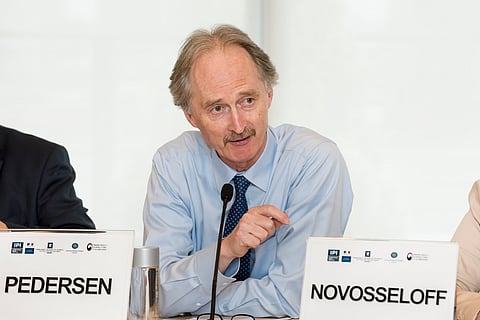

The United Nations’ special envoy to Syria, Geir Pedersen, announced his resignation on Thursday, marking an unexpected end to his six-year tenure at a time when Western policy toward Syria appears to be undergoing a fundamental shift.
Pedersen’s formal mandate had been to implement a UN Security Council resolution calling for a political transition during the Syrian civil war. However, following the fall of former President Bashar al-Assad’s government last December, his mission became increasingly obsolete. Assad—long the figure the U.S. and its allies sought to remove—was no longer in power, leaving questions over the role of the UN in post-war Syria.
While Pedersen cited personal reasons for stepping down, his resignation coincides with significant changes within Washington’s diplomatic corps. Multiple outlets in Turkey and across the Middle East reported the abrupt dismissal or reassignment of several senior U.S. diplomats working on the Syrian portfolio. These included staff at the Syria Regional Platform (SRP), the de facto U.S. mission to Syria based at the consulate in Istanbul, which has operated since the embassy in Damascus closed in 2012.
Among those reportedly removed was SRP Director Nick Granger, along with other senior officials. The SRP, which reports to both the U.S. Special Envoy to Syria and the U.S. Ambassador to Turkey, Tom Barrack, has been central to American policy on Syria. U.S. sources have described the moves as a reorganization, though observers believe the shakeup may reflect a broader policy realignment.
Reports suggest the Trump administration is now leaning toward full engagement with the government of Syrian President Ahmed al-Sharra, in Damascus. This shift could come at the expense of Washington’s long-standing Kurdish partners in northeastern Syria. Since 2015, the Syrian Democratic Forces (SDF) have relied on U.S. military backing to maintain their autonomy and control over territory that includes much of Syria’s oil reserves. Now, however, pressure is reportedly mounting on the SDF to integrate with the central government.
Since the outbreak of the war in 2011, U.S. policy has centered on opposing Damascus while supporting groups and factions opposed to it. But with Assad gone, and with American officials meeting more openly with their Syrian counterparts, Washington appears ready to recalibrate its approach. This pivot comes as Syria’s Foreign Minister, Asaad al-Shaibani, prepares to travel to Washington on Friday to lobby for the lifting of the Caesar Act sanctions—sanctions first imposed by Trump in 2019 that devastated the Syrian economy.